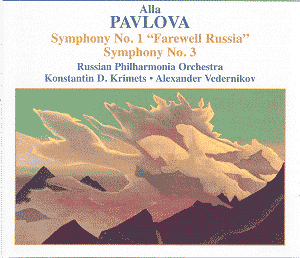Alla Pavlova, born
in 1952, is one of those Russian composers
who had their musical education under
the Soviet system. Pavlova’s flowering
as a composer has been taking place
in a totally different world, especially
in her case, as she has been living
in New York since 1990.
Symphony No.1, written
in 1994, bears the subtitle "Farewell
to Russia", and is an emotional
response to her discovery, on a return
visit to Moscow, that the "country
where we were born and brought up, where
we received our first, childish impressions
of the world, where we were shaped and
matured as individuals, that this country
seemed no longer to exist". This
personal opinion was corroborated by
her old friends in Moscow, amongst whom
there was a deep feeling of both insecurity
and depression, together with an uncertainty
in what the future may bring.
The symphony is scored
for a chamber ensemble made up of string
quintet, two flutes, piccolo, harp,
piano, vibraphone and tam-tam – an unusual
yet surprisingly effective collection
of instruments. The sleeve-note says
that in an interview in April 1996 the
composer said that the symphony’s subtitle
"expresses not only her personal
feelings but, she believes, conveys
the moods and thoughts of many people
in Russia at that particular time of
drastic changes in their society".
It may seem a strange thing to say but
despite the rigid control the State
had over society in Soviet times, there
was a kind of innocence that existed
there, perhaps as a result of its relative
isolation from the influence of western
society. I say this having been a frequent
visitor to friends in Moscow in those
times, as well as to the other countries
within its political orbit, including
spending four years in Prague in the
1970s. Therefore, I can well imagine
the "culture shock" Alla Pavlova
experienced on her return to Moscow
after spending a number of years in
New York.
The music, it seems
to me, reflects that innocence with
its simplicity, exemplified by the sparse
scoring for the small ensemble, which
creates a wistful aura, and the symphony
leaves one with a feeling of sadness
and empathy with the composer and her
friends whose Russia of their youth
has disappeared forever.
Alla Pavlova, so the
sleeve note says "has a special
interest in writing music for film,
dance, theatre and children", and
all these elements, it seems to me,
come into play in her Symphony No.3,
written in 2000. The music reminded
me of both Ippolitov-Ivanov’s "Caucasian
Sketches" and Maurice Jarre’s music
for "Dr. Zhivago" – in other
words it has some very recognisable
"Russian themes", and is extremely
romantic in content, creating a soulful,
reflective and melancholy mood. The
symphony is set over four movements
without any indications of tempo, which
is in fact, the same throughout. Really
it comprises a reworking of one or two
ideas, and each movement comes back
to them from a similar angle. I also
detected a Bulgarian influence that
the composer must have drawn from the
three years she spent in Sofia working
for the Bulgarian National Opera, though
it was "Lara’s theme" from
Dr. Zhivago that most often came
to mind while I listened.
The composer has some
extremely lofty ideals when it comes
to what she hopes the music imparts
to the listener, for she says that she
hopes "that this music will provide
support and inspiration to the listeners
at difficult moments of their lives,
and will strengthen faith in their destiny
and in the profound significance of
a human life" (!) It’s not, therefore,
surprising to note that her source of
inspiration to write this symphony was
a statue of Joan of Arc near to her
home in New York. This music, after
listening to it several times, has yet
to speak to me as Alla Pavlova would
wish, but should it do so then I shall
reach for it at times when I feel need
of the support she seeks to offer. When
I do feel I need such support it is
Beethoven’s string quartets that speak
to me most directly in that respect.
It is interesting to
note that this disc is in Naxos’s ‘21st.
Century Classics’ series, as it seems
a little premature to put any music
so recently written into such a bracket
when only time will determine whether
it is of lasting significance. Meanwhile,
it is a fact that though written in
2000, this music has its roots most
firmly in the late 19th.
century romantic tradition. There’s
nothing wrong with that as far as I’m
concerned as it’s good to know that
people are still motivated to write
hummable tunes, but I just wish she
had developed her themes a little more
so that the symphony was a more satisfactory
whole.
Steve Arloff
